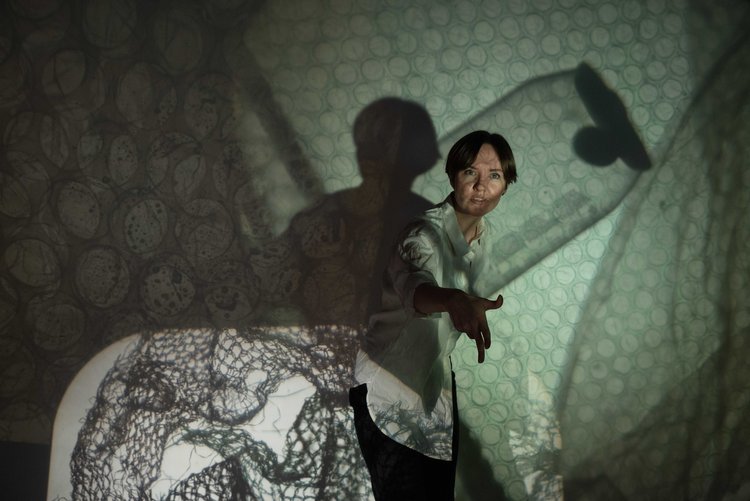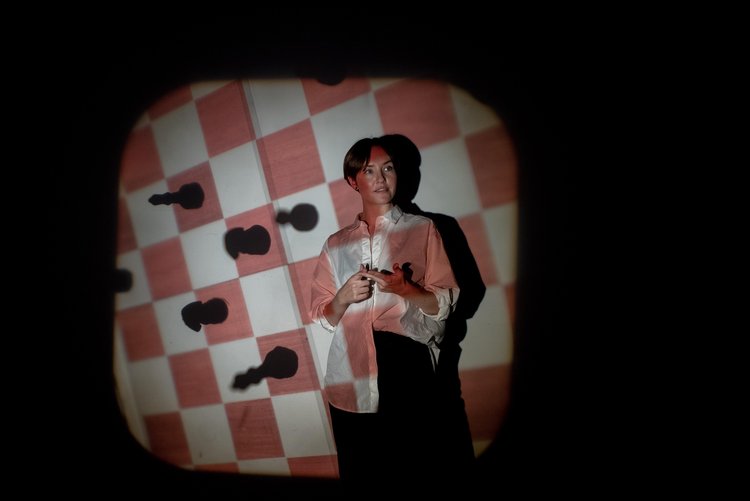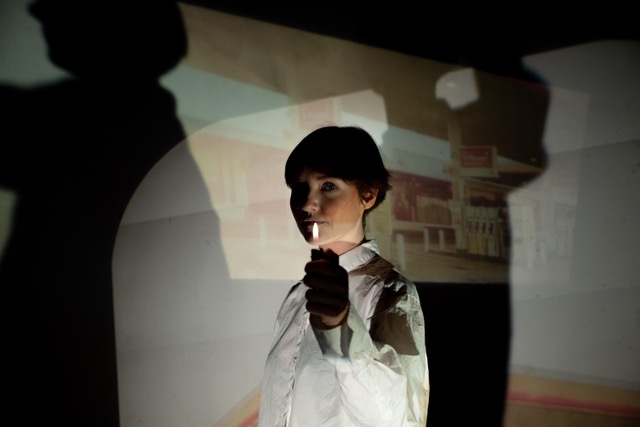“I Love the Smell of Gasoline”: Creator-performer Claren Grosz tells SesayArts why

Who doesn’t recognize the toxic smell of gasoline – yet how many of us inhale it deeply, like some pungent guilty pleasure?
Claren Grosz’s new solo work, provocatively titled I Love the Smell of Gasoline, is set to tap into this vein of contradiction. In the play, Grosz seeks to reconcile her Alberta oil-industry roots – her father and grandfather both worked in the oil industry – with the current environmental emergency. The production, created and performed by Grosz, will run October 6 – 8 at Factory Theatre Studio, as part of the Rutas Festival.
Grosz is a Calgary-raised, Toronto-based artist who is the Artistic Director of Pencil Kit Productions and was the recipient of the 2018 Ken MacDougall Award. The project was born of her frustration with divisive Canadian politics, rampant hypocrisy, and a general lack of team spirit in the face of impending doom. The global energy crisis (coupled with recent gas shortages and price spikes) is a polarizing issue, and Grosz has a unique life story and perspective that enable her to bridge the extremes and keep humanity at the forefront.
In a wide-ranging discussion, she spoke with SesayArts Magazine about her unexpected career in theatre, the election-night origins of I Love the Smell of Gasoline, the invaluable Indigenous perspectives informing it, and the “chewy experience” audiences should expect.
SM: Let’s start with you. What would you like people to know about you and why you chose to pursue a life in the performing arts?
CG: Well I actually very nearly did NOT pursue the performing arts. In high school, I was into visual art and math, and planning on studying architecture. Then my high school drama teacher pulled me and some other students aside and told us we needed to start preparing our auditions for university. It had never occurred to me that theatre could be a career path. But the way she said it with such certainty, as if this was the obvious route for us, the way the other students nodded along as if we were all in agreement on this path, changed my mind in an instant. I still work as a math tutor, actually. And I keep my visual art practice alive, too. There’s room for it all. It’s a pretty sweet life.
SM: Where did the idea for I Love the Smell of Gasoline originate, and what inspired you to write it?
I started writing in the fall of 2019 after the federal election. Canada voted in a Liberal minority while a sea of blue swallowed the prairies. Wexit became a thing. I got phone calls from home filled with angst over sweeping layoffs in the oil and gas sector while my Facebook lit up with memes mocking redneck Albertans for getting what’d been coming to them. Meanwhile, increasingly grim predictions for the environmental apocalypse were being made with whispers of being past the point of no return.
As a Calgarian expat living in Toronto, I regularly navigate conversations with both conservative oil and gas workers and leftist theatre artists. At that moment in time, I really felt this chasm of understanding between these two worlds. I felt a lot of cognitive dissonance— which is a term for the icky feeling you get when you believe two contradicting things at the same time. I wanted to somehow hold these contradicting worlds and give them both voice in a piece of art.
SM: I read that, with this play you try to reconcile your Alberta oil-industry roots (your father ran a company in the oil industry and your grandfather also worked in the industry) with the current environmental emergency. Do you want to speak to how you do this in the play?

CG: So I wanted to find a way that these things could exist in my brain in harmony— that I could find a way of holding the climate crisis, my complicity, my humanity, my love and respect for my family, their complicity, all at once. That’s what this play is about, holding seemingly irreconcilable truths at the same time, and making space for the dissonance and discomfort that comes from that.
You know, I want to save the planet, and I regularly participate in and benefit from industrial, capitalist systems. Shutting down the oil and gas industry might mean economic collapse in Canada, and we have to shut down the oil and gas industry sometime soon. Fossil fuels have been ruinous and violent, and harnessing them has been a brilliant human endeavour. You cannot solve climate change with individual action alone, and collective action is made up of individual action.
This kind of conversation can’t be had without also mentioning reconciliation with Indigenous peoples. I’m writing and presenting this play as someone who has directly benefited from exploitation of the land. I knew it was important for my research and creation process to be informed by Indigenous perspectives. I had the privilege of engaging Cherish Violet Blood (a Blackfoot actress you may have seen be incredible on screen in Scarborough or on stage in Deer Woman), who provided dramaturgical support and consultation, as well as Michelle Robinson (a Dene Calgarian, Liberal politician and former oil and gas worker… check out her podcast) who also consulted on the script.
SM: What a fantastically evocative title for a play! How did you come up with it, and what is its significance to the themes of the play?
CG: Thank you! The title was the very first thing that came to me, and I too thought wow, what a great title, ha! The whole play was built around that, so I hope it lives up to it. For me, the title evokes loving something you shouldn’t, something that’s inappropriate and bad for you. There’s a sinister edge to it— smelling gasoline is dangerous and addictive— but also there’s an innocence to the statement… I liked the smell of gasoline most as a kid, when I didn’t know it was toxic.
SM: What can audiences expect to experience at the play, and what do you hope they will think about – or perhaps act on – after seeing it?
CG: I think the experience will be chewy. I’m going to be getting into science etc, but talking about it from a really personal angle, including stories of bad Tinder dates and working in retail and vacationing with family. And the whole time there will be these beautiful overhead projections being created right before your eyes by very talented people— Elyse Waugh, Jesse Wabegijig, and Stephanie Zeit.
I want people to leave feeling recognized and emboldened. You know, I see a lot of reporting and art that unpacks how appalling industrial human behaviour is and how dire the climate emergency is, and I often find it hard to digest. It leaves you alone to privately wrestle with how you can hold this terrifying reality with your day-to-day reality. And when we can’t handle the weight of environmental collapse at the same time as our day-to-day lives, we might deal with that by shifting the blame away from ourselves, minimizing the crisis, or accepting defeat.
I want to be clear, I do not have answers. But I hope that it provides some space to do some of that emotional processing that we need in order to move forward. And if we can get a little more comfortable holding our own hypocrisy, responsibility, futility, humanity and complicity, can we extend that to others? And can that mean we leave some of our moral absolutism behind and have more productive conversations about what to do about this crisis? I don’t know! Those are my grandiose goals!
SM: Tell us something about you that we will not find on your resumé. Anything that might surprise?

CG: Something really exciting that happened to me recently is that I had an illustrated chapbook of poetry published by Gap Riot Press! I don’t consider myself a poet, so that was definitely surprising for me! This little booklet of my drawings and musings came into existence through the pursuit of pleasure and not any career-oriented goals, and for that reason it was so much sweeter. The book is called starting with the roof of my mouth, if anyone is curious.
Reserve tickets to I Love the Smell of Gasoline on the Rutas Festival website.
© Arpita Ghosal, SesayArts Magazine, 2022
[/responsivevoice]
About The Author
Arpita Ghosal
Arpita Ghosal is a Toronto-based arts writer. She founded Sesaya in 2004 and SesayArts Magazine in 2012.
Visit About Us > Meet the Team to read Arpita’s full bio …



